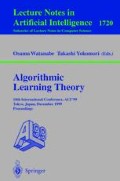Abstract
In this paper we introduce a general method that allows to prove tight linear inequalities between different types of predictive complexity and thus we generalise our previous results. The method relies upon probabilistic considerations and allows to describe (using geometrical terms) the sets of coefficients which correspond to true inequalities. We also apply this method to the square-loss and logarithmic complexity and describe their relations which were not covered by our previous research.
Supported partially by EPSRC through the grant GR/M14937 (“Predictive complexity: recursion-theoretic variants”) and by ORS Awards Scheme.
Access this chapter
Tax calculation will be finalised at checkout
Purchases are for personal use only
Preview
Unable to display preview. Download preview PDF.
References
N. Cesa-Bianchi, Y. Freund, D. Haussler, D. P. Helmbold, R. E. Schapire, and M. K. Warmuth. How to use expert advice. Journal of the ACM, (44):427–485, 1997.
A. DeSantis, G. Markowski, and M. N. Weigman. Learning probabilistic prediction functions. In Proceedings of the 1988 Workshop on Computational Learning Theory, pages 312–328, 1988.
D. Haussler, J. Kivinen, and M. K. Warmuth. Tight worst-case loss bounds for predicting with expert advise. Technical Report UCSC-CRL-94-36, University of California at Santa Cruz, revised December 1994.
Y. Kalnishkan. Linear relations between square-loss and Kolmogorov complexity. In Proceedings of the Twelfth Annual Conference on Computational Learning Theory, pages 226–232. Association for Computing Machinery, 1999.
N. Littlestone and M. K. Warmuth. The weighted majority algorithm. Information and Computation, 108:212–261, 1994.
F. A. Valentine. Convex Sets. McGraw-Hill Book Company, 1964.
V. Vovk. Probability theory for the Brier game. To appear in Theoretical Computer Science. Preliminary version in M. Li and A. Maruoka, editors, Algorithmic Learning Theory, vol. 1316 of Lecture Notes in Computer Science, pages 323–338.
V. Vovk. Aggregating strategies. In M. Fulk and J. Case, editors, Proceedings of the 3rd Annual Workshop on Computational Learning Theory, pages 371–383, San Mateo, CA, 1990. Morgan Kaufmann.
V. Vovk. A game of prediction with expert advice. Journal of Computer and System Sciences, (56):153–173, 1998.
V. Vovk and C. J. H. C. Watkins. Universal portfolio selection. In Proceedings of the 11th Annual Conference on Computational Learning Theory, pages 12–23, 1998.
Author information
Authors and Affiliations
Editor information
Editors and Affiliations
Rights and permissions
Copyright information
© 1999 Springer-Verlag Berlin Heidelberg
About this paper
Cite this paper
Kalnishkan, Y. (1999). General Linear Relations among Different Types of Predictive Complexity. In: Watanabe, O., Yokomori, T. (eds) Algorithmic Learning Theory. ALT 1999. Lecture Notes in Computer Science(), vol 1720. Springer, Berlin, Heidelberg. https://doi.org/10.1007/3-540-46769-6_27
Download citation
DOI: https://doi.org/10.1007/3-540-46769-6_27
Published:
Publisher Name: Springer, Berlin, Heidelberg
Print ISBN: 978-3-540-66748-3
Online ISBN: 978-3-540-46769-4
eBook Packages: Springer Book Archive

